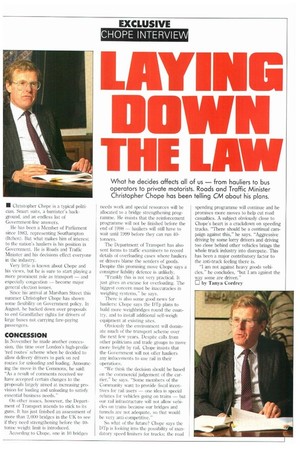THE LAIN
Page 37

If you've noticed an error in this article please click here to report it so we can fix it.
• Christopher Chope is a typical politician. Smart suits, a barrister's background, and an endless list of Government-line answers.
He has been a Member of Parliament since 1983, representing Southampton (Itchea But what makes him of interest to the nation's hauliers is his position in Government. He is Roads and Traffic Minister and his decisions effect everyone in the industry.
Very little is known about Chope and his views, but he is sure to start playing a more prominent role as transport — and especially congestion — become major general election issues.
Since his arrival at Nlarsham Street this summer Christopher Chope has shown some flexibility on Government policy. In August, he backed down over proposals to end Grandfather rights for drivers of large buses not carrying fare-paying passengers.
CONCESSION
In November he made another concession, this time over London's high-profile 'red routes' scheme when he decided to allow delivery drivers to park on red routes for unloading and loading. Announcing the move in the Commons, he said: "As a result of comments received we have accepted certain changes to the proposals largely aimed at increasing provision for loading and unloading to satisfy essential business needs."
On other issues, however, the Department of Transport intends to stick to its guns. It has just finished an assessment of more than 2,000 bridges in the UK to see if they need strengthening before the 40tonne weight limit is introduced.
According to Chope, one in 10 bridges needs work and special resources will be allocated to a bridge strengthening programme. He insists that the reinforcement programme will not be finished before the end of 1998 — hauliers will still have to wait until 1999 before they can run 40tonners.
The Department of Transport has also sent forms to traffic examiners to record details of overloading cases where hauliers or drivers blame the senders of goods, Despite this promising move Chope says a consignor liability defence is unlikely.
"Frankly this is not very practical. It just gives an excuse for overloading. The biggest concern must be inaccuracies in weighing systems," he says.
There is also some good news for hauliers: Chope says the DTp plans to build more weighbridges round the country, and to install additional self-weigh equipment at existing sites.
Obviously the environment will dominate much of the transport scheme over the next few years. Despite calls from other politicians and trade groups to move more freight by rail, Chope insists that the Government will not offer hauliers any inducements to use rail in their operations.
"We think the decision should be based on the commercial judgement of the carrier," he says. "Some members of the Community want to provide fiscal incentives for rail users — one idea is special rebates for vehicles going on trains — but our rail infrastructure will not allow vehicles on trains because our bridges and tunnels are not adequate, so that would he very anti-competitive."
So what of the future? Chope says the Lifp is looking into the possibility of mandatory speed limiters for trucks: the road spending programme will continue and he promises more moves to help cut road casualties. A subject obviously close to Chope's heart is a crackdown on speeding trucks. "There should be a continual campaign against this," he says. "Aggressive driving by some lorry drivers and driving too close behind other vehicles brings the whole truck industry into disrepute. This has been a major contributory factor to the anti-truck feeling there is.
"1 am not against heavy goods vehicles," he concludes, "but I am against the way some are driven."
E by Tanya Cordrey
































































